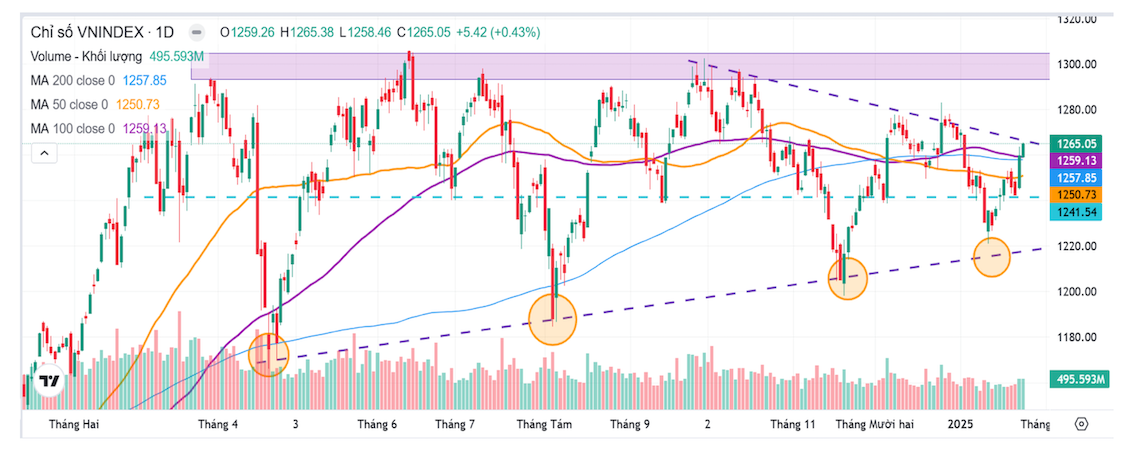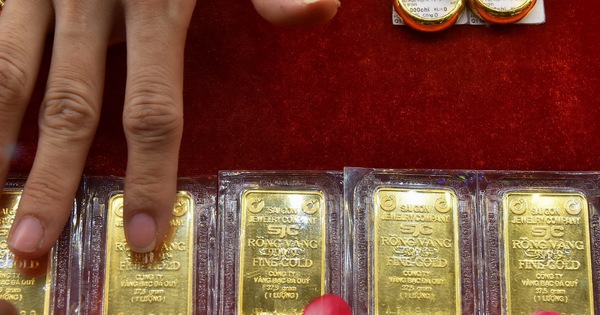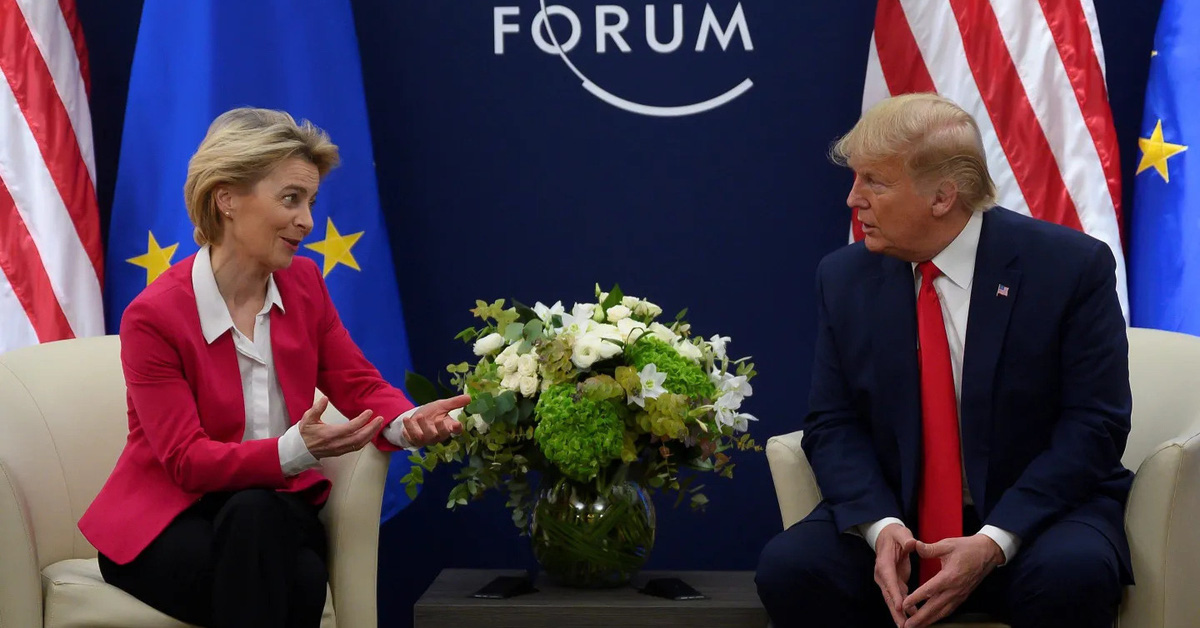In the positive scenario, VN-Index will continue to increase points and conquer the nearest peak at 1,280 points with the main driving force revolving around the banking and retail groups.
Stock market in the first week after Lunar New Year: Expected to conquer the nearest peak of 1,280 points
In the positive scenario, VN-Index will continue to increase points and conquer the nearest peak at 1,280 points with the main driving force revolving around the banking and retail groups.
Fear of trade war
During the Lunar New Year holiday week, the trade war was considered by experts to have officially begun when Mr. Trump imposed a 25% tariff on imports from Canada and Mexico and a 10% tariff on goods from China. Canada responded with a 25% tariff on American goods, while Mexico also prepared to retaliate, investors are watching China's moves this week.
According to MBS Securities experts, it is noteworthy that the decree does not specify the criteria for when tariffs will be lifted. Instead, it includes a retaliation clause if any country takes retaliatory action in any form, indicating the possibility of future tariff increases. The new tariffs are expected to take effect on February 4. In addition, Mr. Trump also announced that he would expand the list of tariffs to many other items such as microprocessors, oil and gas, steel, aluminum, copper and pharmaceuticals. He also affirmed that he would "certainly" impose tariffs on the European Union (EU).
Tariff concerns are expected to exceed 2018 highs.
Spot gold closed above the key $2,800/oz level on Friday (Jan 31) as investors sought to hedge against risk as President Donald Trump's tariff plan raised concerns about economic growth and inflationary pressures globally. Investors are worried that the world is about to enter a new trade war, with higher tariffs and rising inflationary pressures globally. Gold - a safe-haven asset - is often favored in times of economic and geopolitical risks like this. Last January, spot gold prices rose more than 7%, continuing a record streak of more than 40 times last year.
At the end of the trading session on January 31, Brent crude oil futures fell 11 cents to $76.76 a barrel. WTI crude oil futures lost 20 cents (0.3%) to $72.53 a barrel. Last week, Brent and WTI crude oil futures fell 2.42% and 2.85%, respectively, marking the second consecutive week of decline. Mr. Trump said that the tariffs his administration is about to impose on crude oil imported from Canada could be reduced from 25% to 10%. In addition, tariffs on crude oil and gas could start on February 18 instead of February 1. According to experts at MBS Securities, Mr. Trump's imposition of tariffs on crude oil from Canada and Mexico - the two countries that export the most crude oil to the US - could lead to retaliation from these countries and push up gasoline prices in the US.
Differentiated monetary policy
The divide between Japan and the rest of the world is becoming more apparent. The Bank of Japan raised interest rates to 0.5%, while the European Central Bank (ECB), the Bank of Canada (BoC) and the Swedish Riksbank all cut rates by 25 basis points in the past week. With economic activity slowing in the rest of the world (except the US), rate cuts are seen as a necessary step to boost growth, but they cannot be overdone when inflation is still stubborn.
Specifically, at the end of the first monetary policy meeting of 2025, the Fed kept the federal funds rate unchanged at around 4.25-4.5%. In the statement after the meeting, the Fed gave a more cautious view on the persistence of inflation as an explanation for its decision to "sit still". However, the fact that the Fed did not change interest rates at this meeting was expected by the financial market.
The Fed cut interest rates three times in three consecutive meetings late last year, totaling a full percentage point. Moving into 2025, the Fed faces an environment of greater uncertainty, as President Donald Trump’s policies of tariffs, domestic tax cuts and deportations of illegal immigrants could lead to persistently high inflation in the US.
The ECB cut its key interest rate by 25 basis points to 2.75% in a unanimous decision by its governing council, just hours after statistics agency Eurostat said the eurozone economy would not grow in the fourth quarter of 2024.
The ECB has cut interest rates five times since last summer. The interest rate swap market is forecasting two to three more 25-basis-point rate cuts this year.
Analysts and investors believe that with the ECB likely to cut rates more than the Fed this year, the euro will continue to weaken against the dollar, possibly reaching parity with the greenback. “The question now is not whether the ECB will cut rates further this year, but by how much,” wrote Ulrich Kater, chief economist at DekaBank, in a report.
Domestic stock market: unlikely to explode
The domestic stock market recovered for 2 consecutive weeks, regaining 45 points on the basis of low liquidity but the stock market increased across the board. The Vn-Index closed the week at 1,265.05 points, up +15.94 points, equivalent to an increase of +1.28% compared to the previous week, marking the 2nd consecutive week of recovery and regaining 45 points. The market recovered across the board, the increase was mainly concentrated in stock groups such as: Banking, Securities, Retail, Logistics, Natural Rubber, Viettel, Technology, etc.
Market liquidity last week reached VND13,223 billion, up 8.9% compared to the previous week, of which matched liquidity also increased by 15% to VND10,957 billion. According to statistics, market liquidity in January only reached VND12,827 billion, down 30.25% compared to the same period and also down 22.31% compared to December 2024.
Despite the recovery of many Asian currencies against the US dollar, net foreign capital outflow pressure continues. According to MBS, central banks across Asia are facing a difficult decision after the possibility of the Fed cutting interest rates slowed in 2025. Bloomberg's Asia Dollar Index has fallen 4% in 2024 and 0.3% since the start of 2025 as expectations of a change in Fed policy have spurred a shift to holding the dollar. "Asian central banks may need to focus on defending their currencies rather than cutting interest rates to support their domestic economies... Central banks are still likely to maintain their easing bias," said Marcella Chow, global market strategist at JPMorgan Asset Management.
ETFs withdrew a net VND142 billion last week, with the net withdrawal since the beginning of the year reaching about VND609 billion as of January 24. Of which, the majority of the net withdrawal came from VanEck Vietnam (-73 billion), Xtrackers FTSE Vietnam (-32 billion), and DCVFMVN Diamond (-32 billion).
Emerging markets are seeing another disappointing year for investors. Not just in 2024, but over the past decade, the hope that “next year will be better” seems less convincing to investors, especially as the prospect of tariffs and trade wars from Donald Trump has many investors considering pulling out altogether. The MSCI Emerging Markets Index is up less than 5% year-to-date, marking another year of underperformance for the S&P 500.
Looking back over the past 12 years, emerging markets have underperformed the S&P 500 in 11 of them. During that period, U.S. stocks returned investors about 430%, more than 10 times the value of emerging market stocks. The core weakness of emerging markets has been their inability to overcome the strength of the U.S. dollar. The JPMorgan Chase & Co. emerging market currency index is headed for its seventh straight year of losses.
 |
| Source MBS |
Technically, MBS said that the VN-Index has regained more than 45 points in the past 2 weeks, surpassing important average levels such as MA50, MA100 and MA200, but ahead is the resistance level where the downtrend line has been present since October 2024. With the liquidity level in January fluctuating only in the range of 12,000 - 13,000 billion VND/session, the probability of the market having an explosive session to overcome the resistance is low despite having a 2-week consecutive increase. In addition, profit-taking pressure will also occur after 2 weeks of widespread stock recovery. The basic scenario is that the VN-Index will retest the support zone of 1,250 - 1,257 points, where important average lines are present.
According to Mirae Asset experts, in a positive scenario, VN-Index will continue to increase points and conquer the nearest peak at 1,280 points with the main driving force revolving around the Banking and Retail groups.
On the other hand, small declines will be a necessary factor to help consolidate the medium-term upward momentum for the HOSE index. In this scenario, Mirae Asset expects the market to retest the short-term support zone at 1,250 points with downward pressure likely to form at FPT due to the influence of somewhat pessimistic sentiment surrounding US technology stocks that are under selling pressure due to the emergence of the large language model Deepseek, which comes from extremely low research and development costs compared to those of artificial intelligence (AI) giants such as OpenAI and Meta; at the same time, causing investors to question the effectiveness of traditional AI research models and huge investments related to purchasing GPUs from NVIDIA.
Source: https://baodautu.vn/chung-khoan-tuan-dau-sau-tet-nguyen-dan-ky-vong-chinh-phuc-dinh-gan-nhat-1280-diem-d244037.html



















































Comment (0)